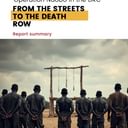
Amid a violent crackdown on pro-democracy movements, Myanmar’s military junta executed four men, including a prominent activist and a former lawmaker.
As family members of the political prisoner reel from the loss, human rights experts and many in the international community have decried the country’s first judicial executions in decades. The U.S. Secretary of State described the executions as “blatant attempts to extinguish democracy.”
Phyo Zeya Thaw, one of the men executed, was a former member of parliament and a close ally of Aung San Suu Kyi, the leader of Myanmar’s democratically elected government who was also arrested after the military coup. He was also a renowned hip-hop and rap artist who inspired young people with his music critical of the military junta. Phyo Zeya Thaw was arrested in November, accused of leading a network of people who carried out what the military described as terrorist attacks.
Kyaw Min Yu, better known as Ko Jimmy, was a leader of the 88 Generation Students Group. His group led hundreds of thousands of protestors in a pro-democracy uprising against military rule in 1988. He was imprisoned for his role in that uprising and again for his role in protests in 2007. Ko Jimmy was arrested a third time in October 2021, accused of violating the counterterrorism law.
The other executed men, Hla Myo Aung and Aung Thura Zaw, were convicted of killing a woman they are said to have believed was a military informer. Both men were reportedly denied access to legal counsel when appealing their death sentences.
The executions were announced by state-controlled media, although journalists have not been able to confirm exactly when or how these men were executed. Like the legal trials, the executions were conducted behind closed doors. Family members of the executed men asked for the return of their loved ones’ bodies but were denied.
The last judicial execution is believed to have been the 1976 hanging of student activist leader Salai Tin Maung Oo, who protested against military rule. The 2022 executions take place amid a larger campaign of arrests and death sentences since the army overthrew the democratically elected government in February 2021. The Assistance Association for Political Prisoners estimates that 2,114 civilians have been arrested and at least 115 people sentenced to death since the army takeover.
Junta officials have said that the men were executed for directing and organizing “violent and inhuman accomplice acts of terrorist killings,” though this allegation is contested. The National Unity Government, a government that formed outside of Myanmar after the military seized power, contests the allegations that the executed men were involved in violence. “Punishing them with death is a way to rule the public through fear,” Aung Myo Min, human rights minister for the National Unity Government, told The Associated Press.
“The entire population of our country is facing arbitrary arrests and all kinds of violence and repression,” Nilar Thein, wife of Ko Jimmy, told Radio Free Asia. “I would say the execution of four people, including my husband and Phyo Zeya Thaw, was blatant murder. … [M]y husband Ko Jimmy stood by his commitment and loyalty to the people until his last breath. He has written a good record for himself and he will never die in our hearts. He will forever live in our hearts, in the hearts of all the people, as a hero.”
Human rights experts in the region and internationally stress that these political prisoners and their loved ones live in fear of the military. “Everyone is reeling,” Manny Maung, a researcher at Human Rights Watch based in Thailand-Myanmar border, told the Washington Post. “If [the military] is prepared to go ahead with this, it just shows they’re going to operate with total impunity.”
U.N. Secretary-General Antonio Guterres denounced the executions as a further deterioration of human rights in the county, calling “for the immediate release of all arbitrarily detained prisoners.” U.N. human rights chief Michelle Bachelet called the executions a “cruel and regressive step” that will only deepen the crisis caused by the military. Thomas Andrews, an independent U.N.-appointed human rights expert, described the men executed as champions of human rights and decency. “I am outraged and devastated at the news of the junta’s execution of Myanmar patriots and champions of human rights and decency,” Andrews said in a statement. “These individuals were tried, convicted and sentenced by a military tribunal without the right of appeal and reportedly without legal counsel, in violation of international human rights law.”
U.S. Secretary of State Antony Blinken denounced the executions and expressed support for the people waging the opposition to military rule. “These reprehensible acts of violence further exemplify the regime’s complete disregard for human rights and the rule of law,” Blinken said in a statement. “The regime’s sham trials and these executions are blatant attempts to extinguish democracy; these actions will never suppress the spirit of the brave people of [Myanmar].”
David Rising, Myanmar executes ex-lawmaker, 3 other political prisoners, Associated Press, July 26, 2022; Al Jazeera, International condemnation after Myanmar executes activists, July 25, 2022; Rebecca Tan and Rachel Pannett, Myanmar junta executes four pro-democracy activists, Washington Post, July 25, 2022. Tharaphi Than, Resistance to military regime in Myanmar mounts as nurses, bankers join protests – despite bloody crackdown, The Conversation, March 15, 2021; Rebecca Ratcliffe and Maung Moe, Myanmar junta executes democracy activists in first such killings in decades, Guardian, July 25, 2022; Radio Free Asia, Global outcry as Myanmar junta executes prominent democracy activists, two others, July 24, 2022; Khin Maung Soe, Interview: Families of executed Myanmar activists press for return of remains, Radio Free Asia, July 24, 2022; Grace Tsoi, Myanmar’s executed activists: Phyo Zeya Thaw and Ko Jimmy, BBC, July 25, 2022.



